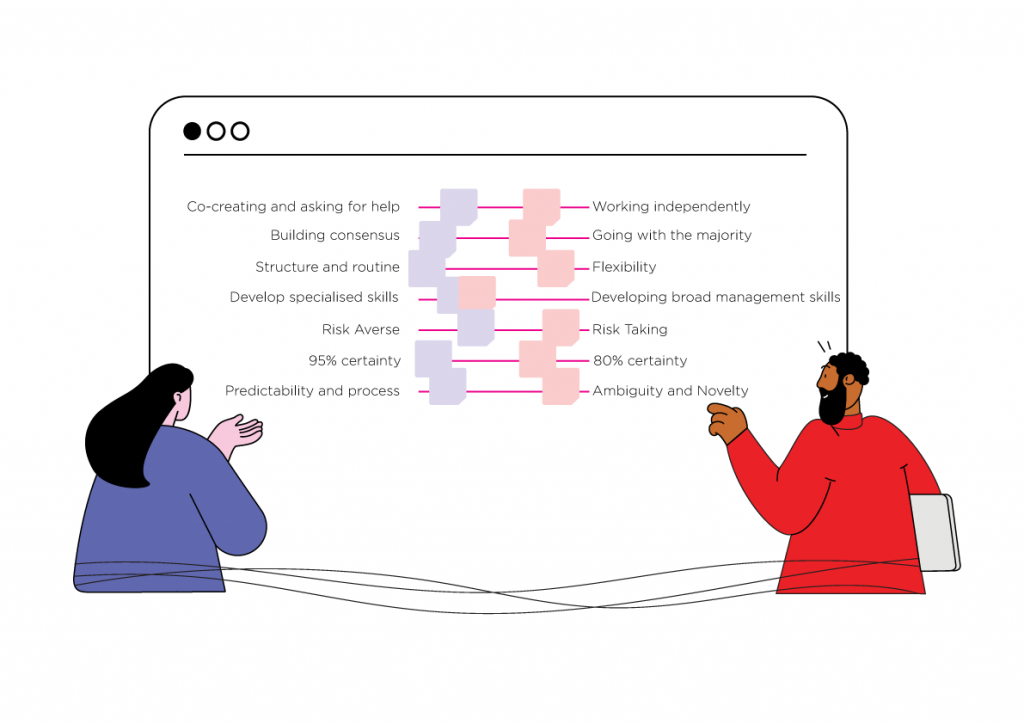Team Values are fundamental, not fluffy

Your values are what you believe are important in how you live and work. They are your worldview of ‘how things should be’. Our behaviour is influenced by what we are motivated to do, what we believe and value. Beliefs and values become our rules for action.
Companies want employees to bring their ‘authentic selves’ to the workplace. This means growing a culture that supports team members to behave in ways consistent with their beliefs and values. Team members who believe the way they are being asked to work aligns with their values will feel happier and more engaged. Connecting our values and purpose to the opportunity to behave authentically at work makes us feel more energised and inspired.
Values are at the heart of relationships both at home and at work. We’ve learned from our social streams that we prefer to listen to and watch people we believe have similar values and worldviews and move away from people whose ideas challenge our values.
The more you feel that your values align with your team members’ values, the more engaged you’ll be. The more engaged we are at work, the more likely we are to infuse positivity amongst our team members. So if we’re committed to creating success as a team, it’s essential to connect the values of different team members to the values you’ve probably already set for your company. Post-pandemic, how distributed teams collaborate and work autonomously and asynchronously requires clarity of the values and behaviours that support effective team working. Given that time spent co-located will likely be the minority, it is a great opportunity to write down these cultural codes explicitly.
Fundamental, not fluffy
Clarity on your immediate team’s values underpins more effective decision-making, priority setting, communication, feedback and onboarding new colleagues.
Consistency of values builds up trust.
When you know what you and everyone else on your team values, you’re empowered.
When the team is connected through shared values, motivation to chase down goals increases. Clearly stated values help minimise conflict.
That’s why values are the vital cornerstone of every team in your business. Unless you define the values that unite you, you can typically only express the culture as a reflection of its leaders’ mottos’ and behaviours’. One of the reasons we disagree with or get upset by others is often due to a divergence of values. We may feel that the other person is disagreeable or short-sighted when the more probable cause may be a mismatch of how we view the world. Shared values and beliefs bring teams together or push them apart.
Invisible values create invisible standards
Until we tell others our values, we can keep coming against challenges in our collaborative work styles with colleagues. It makes it much more challenging to do great work if we don’t have shared expectations of what matters to each of us. Because fundamentally, we don’t all value the same things from work. Edgar Schein defined 8 ‘Career Anchors’ that summarise our preferences and work-related values that are key to our identity; technical or functional competence, general managerial competence, autonomy/independence, security/stability, entrepreneurial creativity, pure challenge, lifestyle and service/dedication to a cause. Once we identify with one of these different anchors, we continue to value them, although they can change as you go through different life stages. Achievement may be important from the start of your career; work-life balance may become more important after you have a family.
Korn Ferry’s K4FD Model helps assess the traits (personality characteristics) and drivers (deep internal values, motivations and aspirations) that notably influence behaviour. Their six drivers are a preference for work-life balance, collaboration, challenge, power, independence and structure. We all value these differently.
Look at the image below of two colleagues mapping out what’s important to them in how they work. Whilst they see work similarly in terms of specialisms, they have divergent views on almost every other dimension. Without discussing their common values, what are their chances of forming an effective team?

Values conflict undermines team performance
A team member who values speed may make a decision independently once they have evaluated all available data. In contrast, another colleague may wait until further research is conducted and only then discuss the opportunity with the entire team using all the data. This is a classic example of values conflict. In truth, it’s not always possible to determine what you think a colleague’s values are because the values they display may not be how they want to behave. They may behave how they feel the organisation wants them to act. This inauthenticity is what Tara McMullin calls this ‘value hijacking’. For example, a company’s explicit value of caring for team members may conflict with actual behaviours of overwork. Values are revealed in everyday behaviours. Taking responsibility or complaining, supporting colleagues or looking after yourself. How should the team behave when they have to make hard choices? To minimise conflict, define your team’s values and how they come to life in the team’s principles, behaviours and the work it produces.
How to define the working experience that the team values
If your purpose and ambition guide your direction as a team, your values support your ability to get there by defining the experience you want to have as a team as you show up every day.
Firstly, generate a first list using the prompts below
What does the company value most?
Defining values at the team level isn’t meant to replace company values; they are written to clarify how the team should put intentions into practice. A good starting place is to connect back to what the company values. Are customers most valued? Is innovation most valued? Is delivering on your financial commitments most valued? Can you express your team’s values in a way that resonates with the broader company culture?
Think about different types of values that work together.
Values cover a vast spectrum so it can be helpful to articulate values in different dimensions:
Personal Characteristics that you value, e.g. Curiosity (Netflix), Passion (Netflix & Spotify), Bravery, Adaptability, Positivity
Values on process and how you make decisions, e.g. Transparency, Doing the right thing (WD-40), Owning it and passionately acting on it (WD-40)
Values on how you deliver and innovate your product/service, e.g. Opportunities rather than risks (Gini), We put people first to go further for our customers (Lloyds)
Collaborative values, e.g. Positive lasting memories in our relationships (WD-40), Selflessness (Netflix)
The values you prioritise must be interrelated and reinforce one another. Innocent Drinks want its employees to be ‘responsible’ and ‘entrepreneurial’, not waiting to be asked to do things. So how do they guard against creating a workplace of independently-minded mavericks? They balance these values with the value of being ‘generous’, which means taking the time to lend experience, staying connected and inclusive and celebrating shared success.
What is undeniable about our most successful moments?
What strengths are we using? How are we working with each other? What sets us apart? How do we make decisions and resolve disagreements?
What do we want to be appreciated for?
What do we value about the contribution we can make? What do we value about other successful teams?
What do we feel most excited about?
Finding and solving problems? Being curious and hypothesising? Innovating? Listening, learning and iterating?
What would we like to be true that is not true yet?
Primarily, the intent is to articulate your team’s values rather than invent aspirational ones. Whilst they absolutely shouldn’t be unrealistic, you may want to include some values you intentionally want to grow into because that is how values help; they guide the experience you want.
For example, if you want different teams to work better together, could you connect the value of citizenship or customer delight with the behaviour of collaboration (rather than the best individual team)?
If you want team members to take more responsibility, connect the behaviour of taking ownership with the value of being open and honest (rather than avoiding conflict).
Use the special language
Every team has unique mantras and memorable sayings, and using words that are already used helps the team emotionally connect with these values. One of AirBnB’s four values is ‘be a cereal entrepreneur’. This sentiment of creative scrappiness honours a story from the company’s early days when the start-up was in debt and decided to launch promotional $40 breakfast cereals for both the Democratic and Republican candidates, creating unprecedented national press coverage for their platform in the process.
Secondly, prioritise down
As you work to reduce your initial generative list to a core list, think about which of the values are most important to the success of this particular team within the constellation of all the teams that make up the company. That’s the real power of clearly defined values and knowing the most important things to the team.
Putting values into practice
Having distilled and articulated them, ensure every team member and future team members going through on-boarding processes find them easy to access.
But like a strategy, values are worthless if they stay on paper. Each team member must commit to and keep each other accountable to living them in your behaviours, routines, practices and decision-making. That means talking about them frequently and calling out when colleagues aren’t behaving in line with the team’s values. These values are ‘how you do things around here’. But they will be challenging to live straight away.
When Bayer redefined their LIFE corporate values in 2020, the challenge was how to help the company’s 100k employees connect with these values. I led a Brand Learning team (an acquisition by Accenture) to develop an employee experience, ‘Learning for LIFE’, that invited colleagues to practice new behaviours by choosing quick individual behavioural experiments and embracing proven Team Practices. By encouraging an experimental mindset that permitted colleagues to work a little differently, our goal was to provide practical relevance and meaning for every employee.
Your team’s values may evolve as the team’s make-up changes or if your team’s goals significantly change. Just don’t be too quick to change them. Like a strategy, they are there to guide you over the mid-term.
Questions to think about
Do you know your own values in priority order?
Do you know the values of others in your team in priority order?
Where is the common ground that unites you to create shared success?
What might happen if you were intentional about dialling up your values and behaviours in your approach to work?
Flow is a ways of working company. We help you to create the conditions where your people can flourish, where decisions, meetings and ideas can flow. If you’d like to discuss how we can help you to define and live your values, get in touch at hi@thisisflow.co
Examples:
Airbnb [accessed 6th June, 2023]
Innocent Drinks [accessed 6th June, 2023]
Gini [accessed 6th June, 2023]
Netflix [accessed 6th June, 2023]
Spotify [accessed 6th June, 2023]
WD-40 Company [accessed 6th June, 2023]






